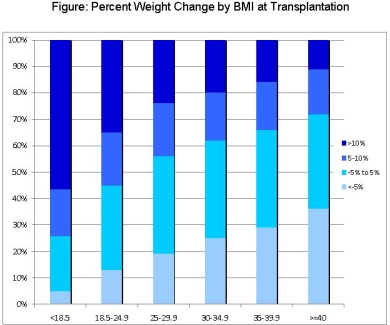Weight Loss, But Not Weight Gain Is a Risk Factor for Graft Loss After Kidney Transplantation
E. Hendren, J. Dong, C. Kennedy, T. Myint, C. Rose, O. Johnston, J. Gill, J. Gill.
Division of Nephrology, University of British Columbia, Vancouver, Canada.
Meeting: 2015 American Transplant Congress
Abstract number: A182
Keywords: Graft failure, Weight
Session Information
Session Name: Poster Session A: Kidney: Cardiovascular and Metabolic
Session Type: Poster Session
Date: Saturday, May 2, 2015
Session Time: 5:30pm-7:30pm
 Presentation Time: 5:30pm-7:30pm
Presentation Time: 5:30pm-7:30pm
Location: Exhibit Hall E
Weight gain is common after kidney transplantation. In this analysis of n=92,688 adult 1st kidney transplant recipients with graft survival of ≥ 1 year between 2000-12, we determined the percent weight change during the 1st post transplant year and the association of percent weight change with graft survival. The percent weight change (figure) during the 1st post transplant year in patients sub-grouped by BMI at transplantation: Weight gain was common and inversely related to BMI at transplantation: 75%, 55%, 44%, 38%, 34%, 28% of patients with BMI <18.5, 18.5-24.9, 25.0-29.9, 30.0-34.9, 35.0-39.9, ≥ 40 kg/m2 had a percent weight gain >5% during the 1st year. 
The table shows the results of separate Cox multivariate models stratified by BMI at transplantation. Patients with weight loss > 5% were at increased of graft loss and this was consistent in all BMI groups with the exception of underweight patients. In contrast, weight gain between 5.1-10.0% was associated with lower risk of graft loss. Even weight gain >10% was associated with either a decreased or unchanged risk of graft loss (table).
| BMI at Transplant | N | Stable Weight (percent change ± 5%) | Weight loss >5.1% | Weight Gain 5.1-10.0% | Weight Gain >10.1% |
| All | 92,688 | 1.00 | 1.21(1.16,1.27) | 0.92(0.87,0.96) | 0.98(0.92,1.01) |
| <18.5 | 2,491 | 1.00 | 0.81(0.47,1.40) | 0.67(0.46,0.96) | 0.63(0.48,0.83) |
| 18.5-24.9 | 30,013 | 1.00 | 1.31(1.16,1.46) | 0.88(0.79,0.98) | 0.90(0.82,0.98) |
| 25.0-29.9 | 31,351 | 1.00 | 1.15(1.05,1.25) | 0.94(0.85,1.03) | 0.99(0.91,1.08) |
| 30.0-34.9 | 19,232 | 1.00 | 1.26(1.13,1.38) | 1.00(0.89,1.12) | 1.01(0.90,1.13) |
| 35.0-39.9 | 7,547 | 1.00 | 1.05(0.91,1.22) | 0.84(0.70,1.00) | 0.97(0.81,1.00) |
| ≥40.0 | 2,054 | 1.00 | 1.57(1.19,2.06) | 0.98(0.69,1.38) | 1.28(0.88,1.88) |
These associations were consistent in secondary models that included adjustment for differences in rejection, DGF, and eGFR at 1 year after transplantation (data not shown).
We conclude that weight loss > 5 % but not weight gain after transplantation is a risk factor for graft loss. Other metrics of the change in body habitus after transplantation should be studied for their association with allograft survival.
To cite this abstract in AMA style:
Hendren E, Dong J, Kennedy C, Myint T, Rose C, Johnston O, Gill J, Gill J. Weight Loss, But Not Weight Gain Is a Risk Factor for Graft Loss After Kidney Transplantation [abstract]. Am J Transplant. 2015; 15 (suppl 3). https://atcmeetingabstracts.com/abstract/weight-loss-but-not-weight-gain-is-a-risk-factor-for-graft-loss-after-kidney-transplantation/. Accessed January 1, 2026.« Back to 2015 American Transplant Congress
